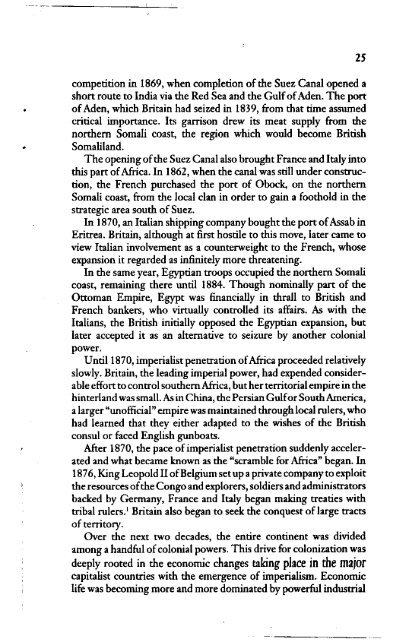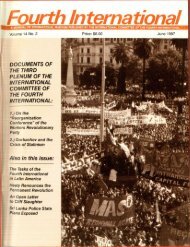Workers League - Behind the US invasion of Somalia - Mehring Books
Workers League - Behind the US invasion of Somalia - Mehring Books
Workers League - Behind the US invasion of Somalia - Mehring Books
You also want an ePaper? Increase the reach of your titles
YUMPU automatically turns print PDFs into web optimized ePapers that Google loves.
competition in 1869, when completion <strong>of</strong> <strong>the</strong> Suez Canal opened a<br />
short route to India via <strong>the</strong> Red Sea and <strong>the</strong> Gulf <strong>of</strong> Aden. The port<br />
<strong>of</strong> Aden, which Britain had seized in 1839, from that time assumed<br />
critical importance. Its garrison drew its meat supply from <strong>the</strong><br />
nor<strong>the</strong>rn Somali coast, <strong>the</strong> region which would become British<br />
Somaliland.<br />
The opening <strong>of</strong> <strong>the</strong> Suez Canal also brought France and Italy into<br />
this part <strong>of</strong> Africa. In 1862, when <strong>the</strong> canal was still under construction,<br />
<strong>the</strong> French purchased <strong>the</strong> port <strong>of</strong> Obock, on <strong>the</strong> nor<strong>the</strong>rn<br />
Somali coast, from <strong>the</strong> local clan in order to gain a foothold in <strong>the</strong><br />
strategic area south <strong>of</strong> Suez.<br />
In 1870, an Italian shipping company bought <strong>the</strong> port <strong>of</strong> Assab in<br />
Eritrea. Britain, although at first hostile to this move, later came to<br />
view Italian involvement as a counterweight to <strong>the</strong> French, whose<br />
expansion it regarded as infinitely more threatening.<br />
In <strong>the</strong> same year, Egyptian troops occupied <strong>the</strong> nor<strong>the</strong>rn Somali<br />
coast, remaining <strong>the</strong>re until 1884. Though nominally part <strong>of</strong> <strong>the</strong><br />
Ottoman Empire, Egypt was financially in thrall to British and<br />
French bankers, who virtually controlled its affairs. As with <strong>the</strong><br />
Italians, <strong>the</strong> British initially opposed <strong>the</strong> Egyptian expansion, but<br />
later accepted it as an alternative to seizure by ano<strong>the</strong>r colonial<br />
power.<br />
Until 1870, imperialist penetration <strong>of</strong> Africa proceeded relatively<br />
slowly. Britain, <strong>the</strong> leading imperial power, had expended considerable<br />
effort to control sou<strong>the</strong>rn Africa, but her territorial empire in <strong>the</strong><br />
hinterland was small. As in China, <strong>the</strong> Persian Gulf or South America,<br />
a larger "un<strong>of</strong>ficial" empire was maintained through local rulers, who<br />
had learned that <strong>the</strong>y ei<strong>the</strong>r adapted to <strong>the</strong> wishes <strong>of</strong> <strong>the</strong> British<br />
consul or faced English gunboats.<br />
After 1870, <strong>the</strong> pace <strong>of</strong> imperialist penetration suddenly accelerated<br />
and what became known as <strong>the</strong> "scramble for Africa" began. In<br />
1876, King Leopold II <strong>of</strong> Belgium set up a private company to exploit<br />
<strong>the</strong> resources <strong>of</strong> <strong>the</strong> Congo and explorers, soldiers and administrators<br />
backed by Germany, France and Italy began making treaties with<br />
tribal rulers. 1<br />
Britain also began to seek <strong>the</strong> conquest <strong>of</strong> large tracts<br />
<strong>of</strong> territory.<br />
Over <strong>the</strong> next two decades, <strong>the</strong> entire continent was divided<br />
among a handful <strong>of</strong> colonial powers. This drive for colonization was<br />
deeply rooted in <strong>the</strong> economic changes taking place in <strong>the</strong> major<br />
capitalist countries with <strong>the</strong> emergence <strong>of</strong> imperialism. Economic<br />
life was becoming more and more dominated by powerful industrial<br />
25





